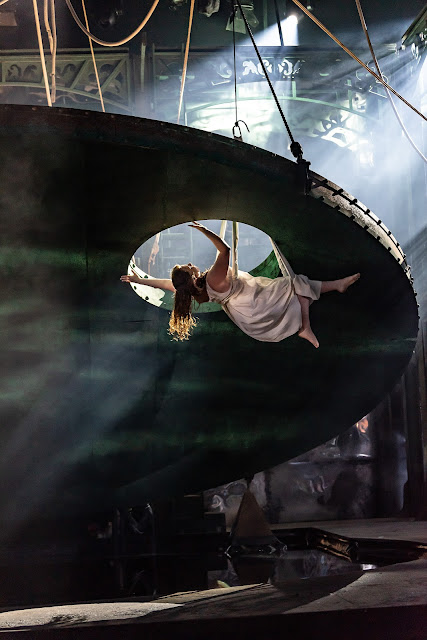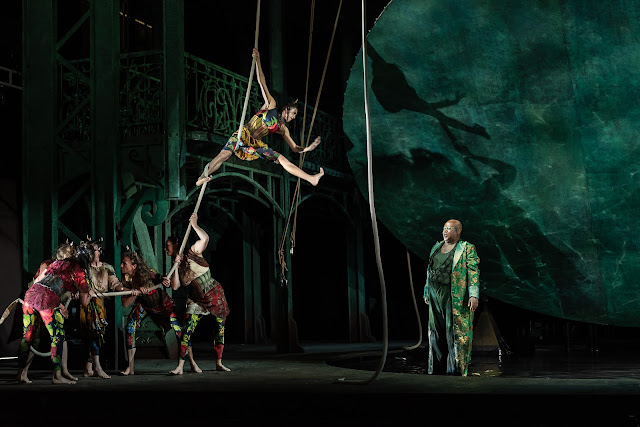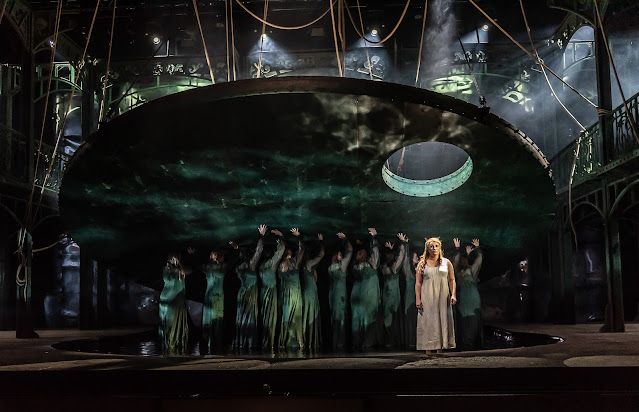 |
| Dvorak: Rusalka - Natalya Romaniw - Garsington Opera (Photo Clive Barda) |
Antonin Dvorak: Rusalka; Natalya Romaniw, John Findon, Henry Waddington, Christine Rice, Sky Ingram, director: Jack Furness, Philharmonia Orchestra, conductor: Douglas Boyd; Garsington Opera at Wormsley,
Reviewed 24 June 2022 (★★★★★)
Musically superb, dramatically convincing and highly poetic account of Dvorak's fairy-tale that combined a poetic approach with a mining of the work's darker element and a highly imaginative staging
Garsington Opera planned its production of Dvorak’s Rusalka for 2020 with Natalya Romaniw in the title role. Cancelled and re-scheduled for 2022, thankfully still with Romaniw, the production debuted last week with a new director at the helm.
We caught Jack Furness’ new production of Dvorak’s Rusalka at Garsington Opera on Friday 24 June 2022. Douglas Boyd conducted the Philharmonia Orchestra with Natalya Romaniw as Rusalka. Illness the cast meant that John Findon (previously Hajny) sang the Prince, Henry Waddington sang Vodnik and Dominick Felix sang Hajny. Christine Rice was Jezibaba, Grace Durham was Kuchtik, and Sky Ingram was the Foreign Princess. Designs were by Tom Piper, lighting by Malcolm Rippeth, choreography by Fleur Darkin with Lina Johansson as circus choreographer.
Dvorak’s opera debuted in 1901, over 20 years after his Slavonic Quartet, the work in which he crystallised his style, combining Czech folk-style rhythms and melodies with Romantic structures. In Rusalka, Dvorak might owe something to Wagner but the sound-world with its rhythms and melodic outlines is pure Czech. And even the story is a similar synthesis, combining elements of Romantic tales like Undine with traditional Czech characters and the poetry of K.J. Erben whose main work, A Garland (1853) created a new style of Czech poetry influence by, but not strictly copying folk poetry. Thus Rusalka is not strictly a traditional Czech folk-inspired work, but a Romantic synthesis.Fascinatingly, just some three years later, Janacek’s Jenufa premiered in Brno. Janacek was just 13 years younger than Dvorak; his mature style, however, developed later and he would leap over Dvorak to jettison the older composer’s Romantic structures and create something uniquely Czech. The Romantic substructure of the opera means that there are variety of ways of presenting Rusalka, from pure fairy tale to a dark Regietheater allegory that takes the story well away from its roots.
 |
| Dvorak: Rusalka - Christine Rice Garsington Opera (Photo Clive Barda) |
Rippeth’s set evoked a turn of the century cast-iron structure, with high level walkways, the detail full of Art Nouveau nature-inspired imagery. In the centre was a large circular platform. During the prelude this platform raised, to reveal a pool beneath. Thanks to some evocative lighting from Malcom Rippeth, this successfully conveyed the idea that the underside of the platform was the top surface of the water, we saw Natalya Romaniw’s Rusalka in the water with John Findon’s Prince leaning over the edge of the platform, gazing into the water.
Throughout the production, this boundary between water and the earth was successfully evoked, and it became an important part of the dramatic narrative. In the Act One scene between Romaniw’s Rusalka and Christine Rice’s Jezibaba we got a strong impression of the way Rusalka did not belong on the land, of her struggle to leave the water. And in Act Three, Furness and Romaniw successfully conveyed the way Rusalka is banished from the water as part of the curse. John Findon’s Prince died in the water pool, the platform covered him and Rusalka walked into the distance. Banished from the water.
The drawback was that all the water creatures and the Prince got very, very wet. This was a poetic and evocative production, but it was a brave one too and challenged the singers to crawl under the platform in the water, to sing when wet and, in the case of Romaniw in Act One, to continue singing despite having slipped and fallen in the water. That they did so with aplomb was impressive indeed, we came away not with a feeling of bravery and challenge, but with extreme poetic emotionalism.
Natalya Romaniw was in strong voice and was everything we might wish for in this character. Vocally poised, she made a case for having the role sung by a rather richer, more dramatic voice than is sometimes the case. She rose effortlessly above Dvorak’s rich orchestration yet created a sense of beauty of line and ravishing tone, as well as incarnating the emotions of the character. Whether singing or not, Romaniw conveyed Rusalka’s complex emotional life.
She rose finely to the challenge of the scenes at the Prince’s court in Act Two where Rusalka is mute, and the singer must convey without words. Furness and choreographer Fleur Darkin successfully used dance to emphasise how Rusalka was not part of the court, how its manners and moeurs simply did not fit in with her view of the world.
 |
| Dvorak: Rusalka - Natalya Romaniw - Garsington Opera (Photo Clive Barda) |
As her Prince, John Findon (singing the role for the second time during this production), conveyed a sturdy integrity, yet Findon also suggested the Prince’s limited outlook, his lack of understanding of what Rusalka was. Furness emphasised this by having the Prince obsessed by hunting, killing animals, and dismembering them himself, an attack on nature which horrified Rusalka. And in a brilliant post-coital scene, Findon and Romaniw conveyed how intimacy between the two was a failure too.
At the end, Findon really found form and his final scene with Romaniw was moving. The Prince is a big sing, the role requires the singer to rise over Dvorak’s orchestra, and Findon did this brilliantly without ever suggesting tiring or strain. This week was a fine debut in the role for him.
Both Romaniw and Henry Waddington as her father, Vodnik, managed to convey the characters’ otherness, that they are not human, their natural habitat is the water. Waddington was almost unrecognisable as Vodnik, bringing a strength and fierce integrity to the role. This Vodnik was not a scary character, but a fierce one and intense. His account of Vodnik’s arias in Act Two, when he appears to Rusalka at the Prince’s court, were powerful and moving indeed.
Sky Ingram was brilliantly self-centred, flirty, and elegant as the Foreign Princess, and Ingram brought a lovely sense of amused puzzlement to her treatment of Romaniw’s Rusalka. Ingram was in good voice and made this small role count. Dominick Felix and Grace Durham made a fine double act as the two servants, gossiping in Act Two, and then bravely going in search of Jezibaba in Act Three. Mark Nathan was the huntsman in Act One.
 |
| Dvorak: Rusalka - Wood Nymphs, with Musa Ngqungwana as Vodnik - Garsington Opera (Photo Clive Barda) |
The setting for the opera was very much the period of its composition, the dress for the courtiers was that of the early 20th century. But that the non-human characters were different was emphasised by costume. The water-sprites in their water-green shifts seemed part of the water, whilst the dress of Vodnik and Jezibaba evoked far earlier eras, they were truly ancient.
Christine Rice’s Jezibaba was seriously grand, wearing a Stuart-style dress that would not have disgraced Queen Mary II of England. She lived in a skull-shaped house and rather than being evil, she was amoral, taking delight in power and in manipulating people. Rice in Act One was simply brilliant, her eyes glittering as she realised quite how much power she could have over Romaniw’s Rusalka. The staging recognised that Jezibaba’s invocation at the end of Act One is a real dance, we had both Rice on top form and a choreographic dance for her assistants.
This brings us to one of the productions other coups. There were six aerialist and acrobats in the cast who were forest beings. They appeared at the opening, and made appearances throughout the opera, not just dancing but shimmying up ropes and taking the movement upwards. This was a production that literally filled the stage with movement. The three wood nymphs, Marlena Devoe, Heather Lowe, and Stephanie Wake-Edwards were similarly active, so that they and the aerialists and acrobats seemed to create and all-singing, all-dancing ensemble.
The Garsington Opera Chorus was on strong form, the women forming a fine group of water-nymphs, living in, singing in and being part of the water, yet in Act Two all (men and women) came together as a fine ensemble of courtiers.
In the pit, Douglas Boyd encouraged the Philharmonia Orchestra to do full justice to Dvorak’s richly complex and multi-layered orchestration, a web of melodic motifs that require the right inflections and finely sprung Czech-style rhythms. From the very opening notes of the prelude we knew we were in good hands, and whilst the singing in the performance was superb, so was the orchestral playing, responding to Dvorak’s music with the right sense of style, intensity, character, and detail.
 |
| Dvorak: Rusalka - Natalya Romaniw - Garsington Opera (Photo Clive Barda) |
Furness brilliantly solved many of the work’s problems. For all its popularity, Rusalka is not an opera that plays itself. Not only did Furness and Piper create a real sense of the divide between the two worlds and the way the characters were embedded in the one or the other, but such challenges as the Act Two scenes at the Prince’s court were finely expressive and rather gripping in a way I have not always encountered. And the ending was profoundly moving, and remarkably uplifting; Romaniw’s farewell to her dead Prince brought a lump to the throat then she, Furness and Piper found the perfect images for the end.
This review also appears in Opera Today.
Never miss out on future posts by following us
The blog is free, but I'd be delighted if you were to show your appreciation by buying me a coffee.
Elsewhere on this blog
- Obsessed by voices: pianist Dylan Perez on recording the complete songs of Samuel Barber - interview
- Closeness & distance: Friedrich Cerha's evocation of Viennese traditional music in a new version for Viennese Schrammel quartet - record review
- Never such innocence: Benjamin Hewat-Craw & Yuhao Guo in RVW, Butterworth & Gurney - record review
- The Lost Art of Frances Cole: recordings from the 1970s provide a glimpse of the art of the Black American harpsichordist - record review
- Giving voice to unconventional instruments: the Lawrence Graduate Bayreuth Tuben Quintet - record review
- Madcap theatre & magnificent music: Janacek's The Excursions of Mr. Brouček at Grange Park Opera - opera review
- A strong affinity to melodic music: I chat to composer John Brunning about his works for guitar - interview
- Strong meat: Grange Park Opera stages Ponchielli's rarity, La Gioconda in a performance that full embraces the work's drama - opera review
- Rising to the challenge: the Young Artists of the National Opera Studio in Sondheim: Before & After - opera review
- Vivid & vibrant: Poul Ruders' Harpsichord Concerto from Mahan Esfahani, Aarhus Symphony Orchestra, Leif Segestam - record review
- Young Artists performance of Tchaikovsky's Eugene Onegin at Opera Holland Park - opera review
- On a highly concentrated scale: Verdi's Macbeth at The Grange Festival - opera review
- Baroque mind games: Handel's Tamerlano at The Grange Festival - opera review
- Home











No comments:
Post a Comment